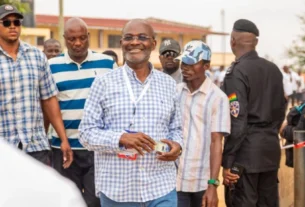Read also:
- Ghana’s President Mahama Removes Chief Justice Gertrude Torkornoo from Office
- Black Stars Open Camp in Accra Ahead of Crucial World Cup Qualifiers
- Gold Stars’ Frimpong Manso: We’ve Evolved into Contenders
- Bayer Leverkusen Parts Ways with Erik ten Hag, Cites Ineffective Team Building
- Otto Addo Urges Calm and Focus for Black Stars’ World Cup Qualifiers.
A severe humanitarian crisis has hit the Sawla-Tuna-Kalba and Bole districts in Ghana’s Savannah Region, where thousands of people have been displaced due to the Gbenyiri conflict. The makeshift camps are overwhelmed, with many residents surviving on just one meal a day. According to reports, 14,000 residents have fled to Vonkore in Ivory Coast, and 17 lives have been lost since the conflict began.
Displaced residents are facing harsh realities, including limited clothing and difficulty accessing food. One resident shared their daily struggle, saying, “We’ve been wearing just one set of clothes. We wash, rinse, and wear it again. We want to return home to collect some of our belongings, but we can’t.” Another resident highlighted the challenge of accessing food, stating, “We are far from Denucation, where food is being distributed. By the time we get there, it is all finished. Yesterday, we managed only one meal—and that was after 4 p.m
Interior Minister Muntaka Mubarak visited the area on Sunday, acknowledging the plight of displaced residents and outlining government action. He tasked the National Disaster Management Organization (NADMO) with compiling accurate daily data on displaced persons to guide relief efforts. Mubarak assured that food and shelter are being distributed, expressing optimism that residents could soon return home. “Food items are coming; we are getting tents and all that. And then we are hopeful that, if by the grace of God, as His Royal Highness has assured us, very soon we will be able to return to their homes”.
Registering displaced persons remains a challenge, especially for those avoiding the camps. NADMO’s Savannah Regional Director, Zakaria Mahama, noted that frequent movement of displaced residents further complicates accurate record-keeping. “Even those at the camps move frequently. They leave for two or three days and travel to other regions. Sometimes they go to Upper West, then to the southern sector. We are unable to know the exact numbers or where they are going”.
The Ministry of Gender, Children and Social Protection (MoGCSP) has provided relief to families displaced by the conflict, distributing cooked meals and water. NORTHCODE Ghana, a national NGO, has also delivered essential relief items, including clean water, sanitary pads, and soap, to address immediate health and hygiene needs in the overcrowded displacement camps.




